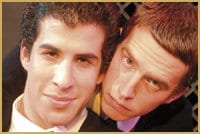One of the more interesting re-imaginings of Shakespeare in recent years is Shakespeare’s R & J, New York playwright Joe Calarco’s re-conceptualizing of Romeo and Juliet, featuring a young, all-male cast acting out Western literature’s most celebrated love story.
Calarco sets his adaptation in a Roman Catholic military school in the 1950s, one so oppressive that all extracurricular books are banned. One night, four schoolboys find a hidden copy of Romeo and Juliet, and secretly, out of sight of their masters, perform it.
Shakespeare’s words become, for these boys, conduits through which to express their burgeoning passions, jealousies, and fears. The adaptation is, essentially, an abridged version of the original, but set in such a startling new context that it acquires new and hitherto undiscovered meanings.
Jack Paterson, director of the Vancouver premiere of the play, which ran at the Beaumont Studios Nov 7-18, describes Shakespeare’s R & J as “a cross between Romeo and Juliet and Lord of the Flies.
“What makes it relevant to today’s audience is love,” says Paterson. “The play is about love. Love is love is love. It is its final statement I think. And since that seems to still be an issue now with areas like gay marriage, [putting the play on] seemed a way to sort of explore and touch on the subject of love, unconditional love.”
So how does recasting Romeo and Juliet in a homosocial context bring new light to this most famous of heterosexual romances?
“Well the playwright, in his notes, says very clearly that it’s not a homoerotic play,” Paterson says. “He actually states that all the boys are straight, which is surprising because Joe [Calarco] himself is gay and also Catholic. And he says in his notes in the beginning that this is not a play about Catholic gay people.”
Paterson looks at his actors and laughs. “We’re not sure if we believe him.”
“I think Calarco lies,” says Josh Drebit, who plays one of the schoolboys. “I think [the play] deals with homosexuality and homoeroticism. And it’s such a nice way to show it, especially in a system like that, or any high school system, having two young guys or four or whatever, and feelings start coming up, whether they know what those feelings are at this point in their lives. “[Romeo and Juliet] is sort of a perfect mirror for something that’s forbidden and these youths deal with that through the story and through Romeo and Juliet, and it gives them a vehicle in which to explore it. It’s just a nice way to make Romeo and Juliet as prevalent and as real as it can be.”
Drebit’s cast mate Jason Emanuel concurs that the play is “very topical. There has been an awareness that’s come into society, especially North American society–I know that some places in Europe are more progressive in that sense, where there is a certain understanding of gay relationships and how they should develop and evolve. I don’t think [in North America] we’ve grown into it yet as a society, I don’t think we’ve fully accepted it yet as a society.
“I think to be able to have such drastic circumstances–a Catholic school, teenagers reading a book that has been banned simply because of its power and passion and some of the things it has to say–taking all those circumstances in consideration, infusing it with the actors bringing it to life and the vision that Jack [Paterson] has created, I think it’s a great opportunity for people to come to the theatre to see something that’s real, that’s relevant, and moreover is extremely moving,” Emanuel says.
“And at the beginning of the piece, when you come into it, you don’t really know where it’s going to go,” he adds, “and by the end of it, it takes you on a journey, so that you walk out and perhaps ask questions of how things have been built in society and the world that we live in.”
Paterson, 32, is one of Vancouver’s premiere young directors and noted in particular for his interpretations of Shakespeare (he directed last year’s wildly acclaimed and multi-Jessie-nominated Titus Andronicus). Asked about the directorial approach that has won him raves, Paterson replies, “I want to see people on that stage that I know or that I recognize. So I want to see my world. I want to be able to understand why these people did what they did.
“For this play it’s seeing four boys. Four teenagers. I remember that experience. I remember the hell it was. I remember my own sexuality, which is sometimes questionable depending on how much I’ve had to drink. Dealing with those issues at an early age. And I work very hard to try and find what makes these characters like us, or what makes us like them.”
This intensely personal approach has once again yielded a winner.
Calarco, I agree, was probably lying about the characters being all straight; but he did so, I think, to prevent directors from turning the play into a standard, generic coming-out story. Leaving the actual orientations of the boys undetermined is a truer reflection of the chaos that is everyone’s adolescence. And Paterson and his cast convey this chaos superbly.
Everything about the show, from the economical yet kinetic blocking to Al Friak’s stark set to the committed, impassioned performances of Drebit, Emanuel, Daryl King and Omari Newton is focused, clear and direct. And the tension between the boys’ initial, hormone-driven rambunctiousness and the gentler, more intimate modes of male interacting that they discover through reading aloud and giving life to Shakespeare’s words–modes forbidden them by the patriarchal dictates of their school–is beautifully realized.
My only complaint about the show is that its run was too short; more people should have witnessed this exquisite production.

 Why you can trust Xtra
Why you can trust Xtra


